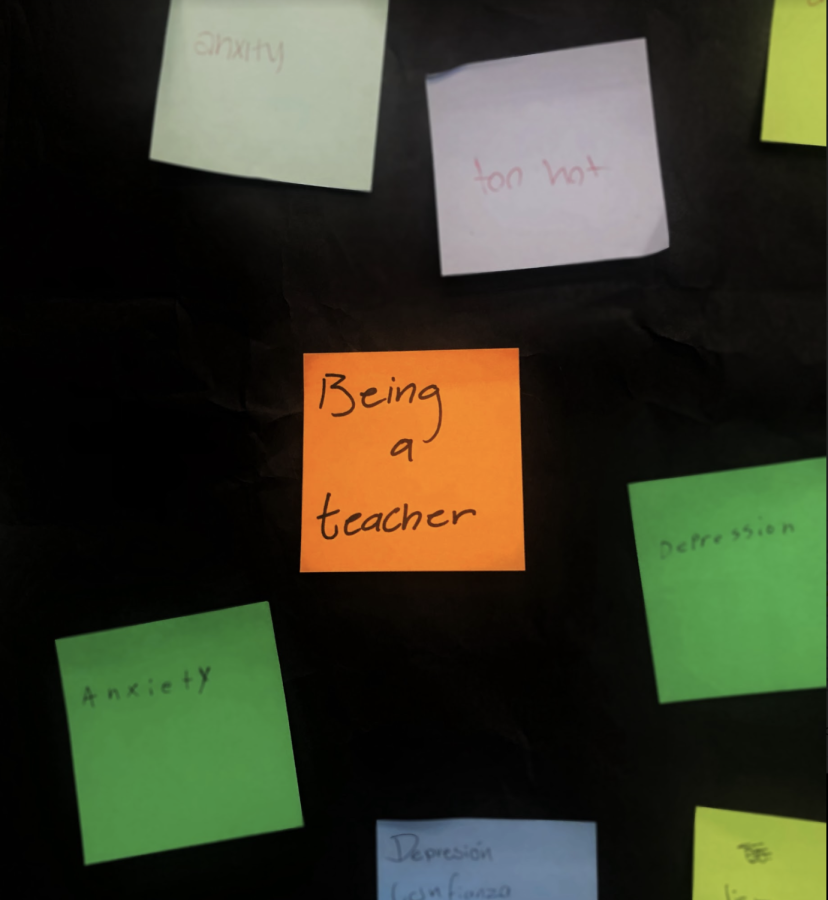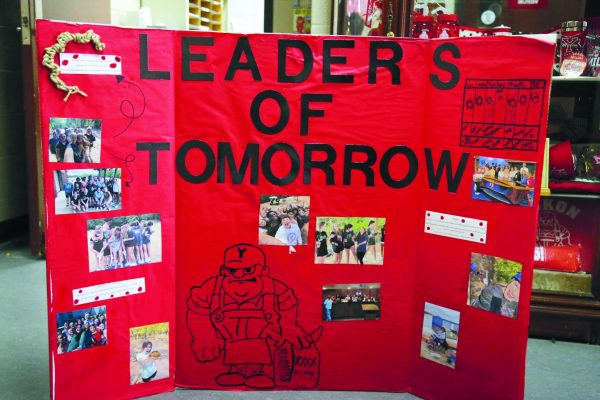Teachers need the same mental health support as students
As part of mental health week, the student council hung a poster in the rotunda where students and teachers can add anonymous post-it notes detailing what they struggle with.
Each year, the student council puts together activities and resources for mental health week aimed to educate students on how they can take care of their mental health whilst simultaneously collecting feedback on what school administrators can do to better promote healthy mentalities within students. However, teachers have expressed concern in regard to being left out of discussions surrounding mental health.
“We put the students first, and rightfully so, but we do tend to put not even just teachers, but adult roles on the back burner,” European history teacher Chelsea Bassham said.“People think that once you’re an adult you have everything figured out and we don’t. We’re just like teenagers without all the angst and constant emotions. We might have those, but they’re a little bit more controlled.”
Caring for the mental health of teachers has always been important, but conversations did not become mainstream until the COVID pandemic occurred which impacted teachers as much as it did students.
“We’ve had to, for a lack of a better term, pivot so many times because we were never trained how to teach online,” theater director Megan Braden said. “For my theatre classes, I had to rewrite my curriculum to keep social distancing and all that during the pandemic. It took a toll on my mental health because it was a lot. It’s a huge workload I wasn’t prepared for.”
Even without the pandemic, teachers have always had a lot on their plate. Being an educator is so much more than just teaching the state curriculum, it comes with responsibilities outside of what’s included in their job descriptions.
“As teachers, we wear so many hats,” Bassham said. “A lot of our students come and talk to us about their problems so we’re kind of the counselor, the parent, all the things. Just taking in a lot of what my students have told me this year and years past, it’s a lot for us to consume. Even if you have the perfect home life and everything’s good when you leave here, taking a lot of that stuff home is a big toll and causes us to stress or worry about certain students.”
Social media users on apps such as TikTok and Instagram have begun to shed light on the impact that being an educator in our modern world has taken on their mental health, which has spread to conversations inside the workplace as well.
“There’s still a lot of progress to be made in terms of how we, as adults, talk about mental health and take care of ourselves,” English III teacher Lucas said. “After [Corona] last year the conversation in our professional developments, lunch meetings and emails is much more mentally and morally supportive. It’s more like, hey, let’s think about our mental health and take care of ourselves.”
Students are given a variety of resources to utilize if they’re struggling with their mental health; counselors, hotlines, support groups, but teachers aren’t provided with the same luxury.
“The school will do like a snack every payday or allow us to wear whatever we want to work as long as it’s appropriate, but it’s little bitty things that are very far in between,” Bassham said. “It’s definitely not enough. We don’t have many resources, not as much as the kids do at least.”
As we move into a post-pandemic era, educators are beginning to realize their self-worth, but there’s still a long way to go in terms of putting themselves first.
“I have seen a beautiful change in the way my teacher peers are understanding the mental health of students and taking more of a conscious effort to be more mindful of their mental health,” Lucas said.“The next part of that evolution is doing that for ourselves.”
While we can’t cure or fix anyone of what they’re going through mentally, students and parents can do their part by simply being mindful of a teacher’s role in society.
“People expect teachers to be at this perfect standard, and we’d love to hit that goal, but it’s not possible because we’re human and we’re not perfect,” Bassham said. ”Some days we don’t do our best while other days we do great, you wouldn’t want someone being hard on you if you’re just trying to make it. I think people need to be sympathetic to that. Don’t feel sorry for me, but have some empathy because I’m a person too and I’m trying my best every day.”

Kat Carlow is a senior and second-year staff member of the Insight. Previously, she was a staff writer for the award-winning Paw Prints newspaper at Whitehouse...



